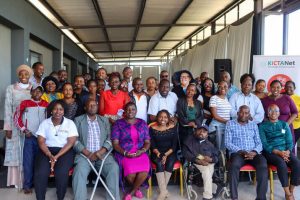Just to add to the debate:
A BBC story on AI outsourcing in Kenya
WHY BIG TECH PAYS POOR KENYANS TO TEACH SELF DRIVING CARS
…..
Brenda does this work for Samasource, a San Francisco-based company that
counts Google, Microsoft, Salesforce and Yahoo among its clients. Most of
these firms don’t like to discuss the exact nature of their work with
Samasource – as it is often for future projects – but it can be said that
the information prepared here forms a crucial part of some of Silicon
Valley’s biggest and most famous efforts in AI.
..
Samasource instead provides a living wage of around $9 a day. That’s an
improvement, but still a pittance for Silicon Valley.
“Yes, it’s cost effective,” Janah said. “But one thing that’s critical in
our line of work is to not pay wages that would distort local labour
markets. If we were to pay people substantially more than that, we would
throw everything off. That would have a potentially negative impact on the
cost of housing, the cost of food in the communities in which our workers
thrive.”
www.bbc.com/news/technology-46055595
<www.bbc.com/news/technology-46055595>
Il lunedì 12 novembre 2018, Barrack Otieno via kictanet <
[email protected]> ha scritto:
> Hi Wainaina and listers,
>
> Unfortunately we don’t have a culture of rewarding local innovations
> and pumping billions into local Research and Development. The global
> north has noticed the talent that abounds locally and is not
> hesitating in tapping into it. I wish we could invest more into our
> Vocational Institutions and provide funding that would help our
> innovators in the Jua Kali space to scale up. That said i would be
> curious to hear what ndugu Ali who has been involved in the start up
> phase or Harry Hare have to say since i consider them authorities in
> the space.
>
> Regards
>
> On 11/12/18, Bernard Kioko via kictanet <[email protected]>
> wrote:
> > Moral rights are not transferrable.
> >
> > On Mon, Nov 12, 2018 at 2:35 PM Patrick A. M. Maina via kictanet <
> > [email protected]> wrote:
> >
> >> Heehe $12,000 for the “best” source code (including moral rights – so
> you
> >> will never get credited if its a big hit) is a complete joke imo.
> >>
> >> I would urge local developers to be cautious about these competitions
> and
> >> approach them strategically.
> >>
> >> For example, you can use these kind of competitions as idea triggers to
> >> (lawfully) get clues and inspiration on what problems need solving
> >> (*without*
> >> participating or signing up, as that potentially binds you to their
> T&Cs)
> >> –
> >> then form teams/coalitions to solve these problems independently for a
> >> much
> >> bigger potential payoff.
> >>
> >> On policy these things are happening because there are glaring loopholes
> >> in our intellectual property laws that allow *IP mining* to take place
> >> without any restriction or consequences. Its literally a free for all.
> >>
> >> Kenya needs an “Intellectual Property Resources Act”, which would
> >> invalidate exploitative contracts / terms and conditions is long
> overdue.
> >> This is the kind of 21st Century legislation that can stimulate
> >> innovation
> >> and the creation of *high quality jobs* in Kenya.
> >>
> >> 21st Century resources include:
> >> 1. Attention or engagement (systems designed to distract people from
> >> contributing to economic activity)
> >> 2. Data (for mining/analytics or ML)
> >> 3. Source code, novel circuits, algorithms, chemical formulations,
> >> mixtures, blue prints (including business plans, pricing models etc).
> >> 4. Valuable ideas (e.g. “please call me”) that cannot be protected via
> >> any
> >> combination of the old industrial era laws e.g. patents, copyright, UM &
> >> DM.
> >> 5. other?
> >>
> >> Thanks for the heads up and Good day!
> >> Patrick.
> >>
> >> On Monday, November 12, 2018, 2:01:43 PM GMT+3, Wainaina Mungai via
> >> kictanet <[email protected]> wrote:
> >>
> >>
> >> Some developers are raising concerns privately that great initiatives
> >> such
> >> as Zindi are “cheaply buying AI code” from Africa
> >> zindi.africa/faq/data_scientists
> >>
> >> According to them, “Zindi runs high-value expertise programming
> >> competitions/ hackathons in Kenya and Nigeria… and demands code in
> >> exchange for low pay prizes. It is unfairly low-cost labour for them.”
> >>
> >> See attached. Are their concerns valid?
> >>
> >>
> >> _______________________________________________
> >> kictanet mailing list
> >> [email protected]
> >> lists.kictanet.or.ke/mailman/listinfo/kictanet
> >> Twitter: http://twitter.com/kictanet
> >> Facebook: www.facebook.com/KICTANet/
> >> Domain Registration sponsored by www.eacdirectory.co.ke
> >>
> >> Unsubscribe or change your options at
> >> lists.kictanet.or.ke/mailman/options/kictanet/pmaina
> 2000%40yahoo.com
> >>
> >> The Kenya ICT Action Network (KICTANet) is a multi-stakeholder platform
> >> for people and institutions interested and involved in ICT policy and
> >> regulation. The network aims to act as a catalyst for reform in the ICT
> >> sector in support of the national aim of ICT enabled growth and
> >> development.
> >>
> >> KICTANetiquette : Adhere to the same standards of acceptable behaviors
> >> online that you follow in real life: respect people’s times and
> >> bandwidth,
> >> share knowledge, don’t flame or abuse or personalize, respect privacy,
> do
> >> not spam, do not market your wares or qualifications.
> >> _______________________________________________
> >> kictanet mailing list
> >> [email protected]
> >> lists.kictanet.or.ke/mailman/listinfo/kictanet
> >> Twitter: http://twitter.com/kictanet
> >> Facebook: www.facebook.com/KICTANet/
> >> Domain Registration sponsored by www.eacdirectory.co.ke
> >>
> >> Unsubscribe or change your options at
> >> lists.kictanet.or.ke/mailman/options/kictanet/bkioko
> %40bernsoft.com
> >>
> >> The Kenya ICT Action Network (KICTANet) is a multi-stakeholder platform
> >> for people and institutions interested and involved in ICT policy and
> >> regulation. The network aims to act as a catalyst for reform in the ICT
> >> sector in support of the national aim of ICT enabled growth and
> >> development.
> >>
> >> KICTANetiquette : Adhere to the same standards of acceptable behaviors
> >> online that you follow in real life: respect people’s times and
> >> bandwidth,
> >> share knowledge, don’t flame or abuse or personalize, respect privacy,
> do
> >> not spam, do not market your wares or qualifications.
> >>
> >
> >
> > —
> > <bernardkioko.com?promo=email_sig&utm_source=product
> &utm_medium=email_sig&utm_campaign=gmail_api&utm_content=thumb>
> > Bernard Kioko
> > bernardkioko.com
> > <bernardkioko.com?promo=email_sig&utm_source=product
> &utm_medium=email_sig&utm_campaign=gmail_api&utm_content=thumb>
> >
>
>
> —
> Barrack O. Otieno
> +254721325277
> +254733206359
> Skype: barrack.otieno
> PGP ID: 0x2611D86A
>
> _______________________________________________
> kictanet mailing list
> [email protected]
> lists.kictanet.or.ke/mailman/listinfo/kictanet
> Twitter: http://twitter.com/kictanet
> Facebook: www.facebook.com/KICTANet/
> Domain Registration sponsored by www.eacdirectory.co.ke
>
> Unsubscribe or change your options at lists.kictanet.or.ke/m
> ailman/options/kictanet/nmutungu%40gmail.com
>
> The Kenya ICT Action Network (KICTANet) is a multi-stakeholder platform
> for people and institutions interested and involved in ICT policy and
> regulation. The network aims to act as a catalyst for reform in the ICT
> sector in support of the national aim of ICT enabled growth and development.
>
> KICTANetiquette : Adhere to the same standards of acceptable behaviors
> online that you follow in real life: respect people’s times and bandwidth,
> share knowledge, don’t flame or abuse or personalize, respect privacy, do
> not spam, do not market your wares or qualifications.
>



